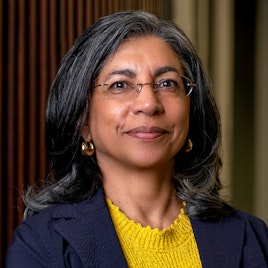Investing in India, One Entrepreneur at a Time
By Binaifer Nowrojee

There are countless examples from across the globe of the role social enterprises can play in emerging economies. Not only do these businesses produce innovative products and improve services, they also help bring people out of poverty, stimulate growth, and lead to job creation.
India, where social entrepreneurship has mushroomed over the past decades, is no exception. Thousands of startups have brought innovative solutions with real benefits for ordinary Indians in fields ranging from healthcare and education, water and sanitation, nutrition, and financial support. These businesses have been backed by impact investors deploying patient capital in support of businesses that deliver both financial and social benefits.
But while this industry is booming in India, it is also very young. According to one recent study, of the close to two million social enterprises in India, 57 percent were founded in the last five years and are classified as “new businesses.” New small- and medium-sized enterprises face familiar challenges in any field: recruitment, marketing, or access to financial support to get through the first uncertain years. These can be even harder to overcome for social enterprises, since they often work in fields considered too risky, or insufficiently profitable, by many investors.
At the Open Society Foundations we are determined to tackle these challenges head-on. There is no question that economic power can be used to both oppress and liberate, and the right investment can be a real force for social justice and can complement progressive policymaking. That is why Open Society, through its impact investment arm the Soros Economic Development Fund, has over the past years provided tens of millions of U.S. dollars to investment funds that support early-stage businesses aimed at helping low- to middle-income people across India. This has built on Open Society’s earlier work, in the late 2000s, when it established a $17 million impact investment fund with other investors.
Investment in social enterprise is crucial to not just improve the lives of the hundreds of millions of Indians still living in poverty. It can also help the so-called forgotten middle—the almost 500 million Indians who are living above the poverty line, but who are not part of the wealthier urban elites. This is a group that is all too often ignored by investors, even though it is hungry for improved services, has purchasing power, and plays an extremely important role in generating sustainable economic growth.
It has been inspiring to see the ideas coming from some of the innovators Open Society has been fortunate enough to support.
Take WayCool, an agritech startup out of Chennai. Since it was founded in 2015, WayCool has tried to improve transparency and efficiency in a market that affects every Indian: fruits and vegetables. By building agriculture supply chains to help small-hold farmers access markets, the company has been able to reduce wastage in delivering fruits and vegetables across the country, while also ensuring that farmers get a fairer and better deal for their produce. Today, the company sells more than 50 tons of produce daily, sourced from more than 20,000 farmers in India.
Perhaps most impressively, WayCool has also been able to increase profits for small-scale farmers across the country. This is particularly important given the financial strains many Indian farmers feel, as illustrated by the tragic rise in farmer suicides over the past decades.
Another example is Dunzo, a Banglaore-based company for whom the cliché “hyperlocal” feels, for once, like a perfect fit. Dunzo first started as a WhatsApp group but has evolved into a fully fledged standalone mobile app dedicated to helping out with everyday errands. If you’re in Bangalore and need your dry cleaning picked up, groceries bought, or a package delivered, a Dunzo “agent” is ready to assist—usually in no more than eight minutes. The company has generated a fair amount of buzz since it was first launched and was also Google’s first direct startup investment in India.
Finally, there’s Capital Float, a company dedicated to solving one of the most pressing needs of any small- to medium-sized business: access to funds. Capital Float provides small businesses with short-term working capital with finance against future corporate receivables. Most small businesses in India operate with cash credit cycles of 60 days or longer, and receivables finance and overdraft facilities are largely unavailable for small firms—especially those in service-oriented businesses without significant hard assets. Capital Float recently raised $45 million from investors including Amazon and Ribbit.
These are just some examples of the next generation of the most exciting and impactful entrepreneurs in India. As infectious and inspiring as their creativity and desire to do good are, there is no question that such entrepreneurs will continue to need support moving forward. At the Open Society Foundations, we will do what we can to make this a reality and bring other likeminded investors with us.

Binaifer Nowrojee is the president of the Open Society Foundations.